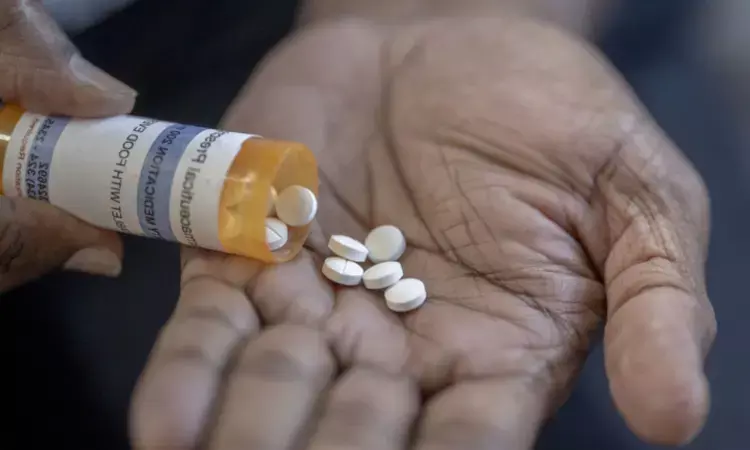- Home
- Medical news & Guidelines
- Anesthesiology
- Cardiology and CTVS
- Critical Care
- Dentistry
- Dermatology
- Diabetes and Endocrinology
- ENT
- Gastroenterology
- Medicine
- Nephrology
- Neurology
- Obstretics-Gynaecology
- Oncology
- Ophthalmology
- Orthopaedics
- Pediatrics-Neonatology
- Psychiatry
- Pulmonology
- Radiology
- Surgery
- Urology
- Laboratory Medicine
- Diet
- Nursing
- Paramedical
- Physiotherapy
- Health news
- Fact Check
- Bone Health Fact Check
- Brain Health Fact Check
- Cancer Related Fact Check
- Child Care Fact Check
- Dental and oral health fact check
- Diabetes and metabolic health fact check
- Diet and Nutrition Fact Check
- Eye and ENT Care Fact Check
- Fitness fact check
- Gut health fact check
- Heart health fact check
- Kidney health fact check
- Medical education fact check
- Men's health fact check
- Respiratory fact check
- Skin and hair care fact check
- Vaccine and Immunization fact check
- Women's health fact check
- AYUSH
- State News
- Andaman and Nicobar Islands
- Andhra Pradesh
- Arunachal Pradesh
- Assam
- Bihar
- Chandigarh
- Chattisgarh
- Dadra and Nagar Haveli
- Daman and Diu
- Delhi
- Goa
- Gujarat
- Haryana
- Himachal Pradesh
- Jammu & Kashmir
- Jharkhand
- Karnataka
- Kerala
- Ladakh
- Lakshadweep
- Madhya Pradesh
- Maharashtra
- Manipur
- Meghalaya
- Mizoram
- Nagaland
- Odisha
- Puducherry
- Punjab
- Rajasthan
- Sikkim
- Tamil Nadu
- Telangana
- Tripura
- Uttar Pradesh
- Uttrakhand
- West Bengal
- Medical Education
- Industry
Empagliflozin use feasible for HFpEF patients whether or not they are taking diuretics: JAMA

USA: Empagliflozin treatment in patients with heart failure and preserved ejection fraction (HFpEF) is similar regardless of diuretic dose or use; and may lead to a reduced need for diuretics, a recent study published in JAMA Cardiology has pointed out.
The post hoc analysis of a randomized clinical trial showed that empagliflozin is associated with comparable improvements in time to heart failure (HF) hospitalization or cardiovascular death, rate of decline in eGFR (estimated glomerular filtration rate), first and total HF hospitalization, and health status, irrespective of background diuretic use or dose. In addition, empagliflozin was linked with a reduced chance of diuretic initiation or dose escalation and an elevated likelihood of diuretic de-escalation and discontinuation after randomization.
The diuretic effect of SGLT2 (sodium-glucose cotransporter 2) inhibitors may interact with background diuretic therapy in HFpEF patients. Javed Butler, University of Mississippi Medical Center, Jackson, and colleagues aimed to evaluate the efficacy and safety of empagliflozin in combination with background diuretic therapy and the association of empagliflozin with the requirement for conventional diuretics.
The study was a post hoc analysis of the EMPEROR-Preserved, a phase 3, placebo-controlled, double-masked, randomized clinical trial. It included patients with class II to IV heart failure and left ventricular ejection fraction greater than 40%. Of 5988 enrolled patients, the analysis included 5815 patients (mean age, 71.9 years; 44.6% were females) with baseline data on diuretic use.
Patients in the EMPEROR-Preserved trial were randomized to empagliflozin or placebo. The analysis categorized the participants into four subgroups: no diuretics and furosemide-equivalent diuretic doses of less than 40 mg, 40 mg, and greater than 40 mg at baseline.
The study's primary outcomes were the first hospitalization for HF (HHF) or cardiovascular death (CV death) and its components. They assessed the association of empagliflozin versus placebo with outcomes by baseline diuretic status (no diuretic versus any dose) and dose (> 40mg, 40 mg, <40 mg, and no diuretic). They also studied the association of empagliflozin use with changes in diuretic therapy.
The study revealed the following findings:
- Of 5815 included patients, 20.3% were not taking diuretics, 29.7% were taking less than 40 mg, 30.5% were taking 40 mg, and 19.6% were taking more significantly than 40 mg.
- In the placebo arm, patients with higher diuretic doses had worse outcomes.
- Empagliflozin decreased the risk of cardiovascular death or hospitalization for heart failure, irrespective of background diuretic status (hazard ratio [HR], 0.81] for the diuretic group vs HR, 0.72 for the nondiuretic group).
- Diuretic status was not associated with changes in improvements in first HHF, total HHF, rate of decline in estimated glomerular filtration rate, and Kansas City Cardiomyopathy Questionnaire 23 clinical summary score with empagliflozin.
- Findings were consistent when patients were categorized by diuretic dose.
- Empagliflozin was associated with a decreased likelihood of diuretic dose escalation (HR, 0.74) and an increased chance of de-escalation (HR, 1.15).
- Empagliflozin was associated with an increased risk of volume depletion in diuretic patients (HR, 1.34).
"The findings suggest that treatment with empagliflozin in patients with HFpEF should be independent of diuretic therapy and may result in reduced need for diuretics," the researchers concluded.
Reference:
Butler J, Usman MS, Filippatos G, et al. Safety and Efficacy of Empagliflozin and Diuretic Use in Patients with Heart Failure and Preserved Ejection Fraction: A Post Hoc Analysis of the EMPEROR-Preserved Trial. JAMA Cardiol. Published online May 24, 2023. doi:10.1001/jamacardio.2023.1090
Dr Kamal Kant Kohli-MBBS, DTCD- a chest specialist with more than 30 years of practice and a flair for writing clinical articles, Dr Kamal Kant Kohli joined Medical Dialogues as a Chief Editor of Medical News. Besides writing articles, as an editor, he proofreads and verifies all the medical content published on Medical Dialogues including those coming from journals, studies,medical conferences,guidelines etc. Email: drkohli@medicaldialogues.in. Contact no. 011-43720751


